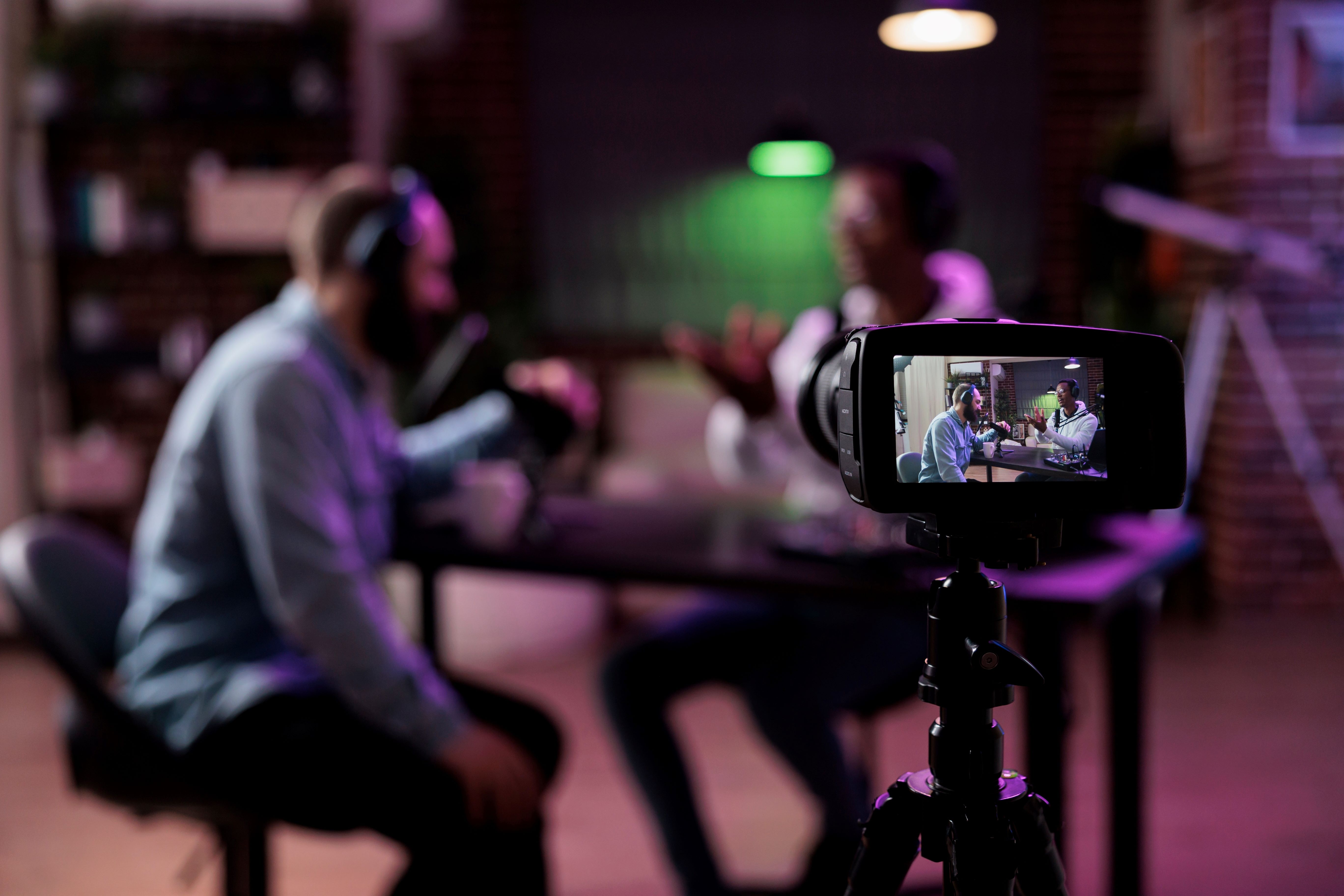في مساحة تتخلّلها إضاءة خافتة في أغلب الأحيان، بينما الصمت الذي يوحي به المكان تُكسِّره أصوات تحمل نبرة منخفضة، يجلس شخصان أو أكثر ليتبادلا أطراف الحديث، يجولان بين الماضي والحاضر ويُشرِّحان الوقائع والتجارب بانطباعات ذاتية وموضوعية، تبلغ بينهما الحميمية في النقاش ذروتها وتصبح الاعترافات في خانة المُباح.
هذا المشهد قد توثِّقه عدسات الكاميرات أو يُكتفى بالصوت فقط. ربما يحيلك هذا الوصف إلى حوار دائر بين شخصين أو أكثر على ظاهرة غَزت المشهد الإعلامي ومنصات البث في السنوات الأخيرة، بل يمكن القول إنها استقت من بعض أجناسه قواعد لكنها حادت عن أخرى وانحرفت عنها، لتُنتج لنا "البودكاست" في هيئته المُتعارف عليها الآن.
وُلِد "البودكاست" في شكله الأول من رَحِم الإذاعة، حينما شرعت المحطات سنة 2004 في نشر حلقات برامجها وإتاحتها للعموم على الإنترنت بغرض تحميلها والاستماع إليها. وتعود جذور هذا المسمى إلى دمجِ اسم جهاز "Ipod" الصوتي الذي أنتجته شركة "آبل" آنذاك وكلمة "Broadcast" أي الإذاعة، وقد جرى تبنِّي هذا اللّقب من طرف الصحفي في جريدة "الغارديان" بين هاميرسلاي (1).
امتد الانتشار الواسع لـ "البودكاست" إلى الإعلام بميادينه كافة، ونشط فيه أفراد لا علاقة لهم بالمهنة ويصطبغ ما يُنتجونه من حلقات بلمسة شخصية بحتة؛ إذ يكفي أنهم يشتغلون في مجال مُعين مما يمنحهم إمكانية مناقشته انطلاقا من تجاربهم الشخصية.
الصّحافة الرياضية أو المنتوج الإعلامي الرياضي لم يزِغ بدوره عن القاعدة، وانصهر في بوتقة "البودكاست"، الذي يُعد حاليا من أكثر الإنتاجات الصحفية استهلاكا من طرف المتلقي؛ إذ تشير إحصاءات حديثة إلى أن عدد البرامج المُندرجة في جِنس "البودكاست" في العالم يصل إلى أربعة ملايين منها النشطة والمتوقفة، بينما يناهز عدد الحلقات الصادرة المُحصاة مئتي مليون(2).
"الحميمية"
في العقود السابقة، حين كانت الإذاعات في أوْجِها وعُنفوانها قبل انتشار الإنترنت، طفت على المشهد برامج تنتجها محطات "الراديو" وتتيح المجال للمستمعين كي يشاركوا تجاربهم، كان الأمر يجري في نطاق خاص وحميمي للغاية، مع حجب هُويات المتصلين وتحريفها، مما يعطي لهؤلاء الحرية شبه الكاملة للبوح ومشاركة همومهم ومعاناتهم.
هذه "الحميمية" التي كانت تتميز بها بعض البرامج الإذاعية ظلَّت عنصر جذب سحري للمستمعين، الذين يملكون الفضول للاطلاع على ما يعيشه الآخرون، وقد اشتهرت هذه البرامج على نطاق واسع في العالم العربي، خصوصا في بداية الألفية الثالثة.
في سنة 2023، أنجزت منصة "أوفيرلاب" الرياضية حوارا مع الدولي الإنجليزي ولاعب توتنهام هوتسبر السابق، ديلي آلي. كانت الحلقة حافلةً بالاعترافات وذات منسوب مرتفع من البوح(3)، وقد نقلت المنصة إلى مستوى آخر من الانتشار محقق حتى الآن أكثر من ستة ملايين مشاهدة عبر موقع يوتيوب وحده، فضلا عن ملايين أخرى في منصات البث والإذاعة الأخرى.
في سنة 2023، أنجزت منصة "أوفيرلاب" الرياضية حوارا مع الدولي الإنجليزي ولاعب توتنهام هوتسبر السابق، ديلي آلي. كانت الحلقة حافلةً بالاعترافات وذات منسوب مرتفع من البوح وقد نقلت المنصة إلى مستوى آخر من الانتشار محقق حتى الآن أكثر من ستة ملايين مشاهدة عبر موقع يوتيوب وحده.
أقرَّ ديلي آلي، وقتذاك، بأسرار غير مسبوقة تكسر الصورة النمطية عن الرياضيين، سَردَ رحلته مع الإدمان والمعاناة النفسية التي عاشها، وعَاد كذلك لينبش في الماضي ويتحدث عن تجربته المريرة مع الاعتداء الجنسي الذي تعرض له في سن السادسة، مفصحا عن خضوعه لإعادة التأهيل النفسي في الصيف الفارط بإحدى المصحات في الولايات المتحدة الأمريكية.
لقد انتشرت الحلقة على نحو واسع، دار الحوار بين اللاعب الإنجليزي السابق ومُدربه غاري نيفيل (لاعب مانشستر يونايتد السابق) وديلي آلي من دون تكلف أو اصطناع، كانت الكلمات تندفع بتلقائية وتحدث تأثيرا مباشرا لدى الكثيرين، متخذة هيئة حصة بين معالج نفسي وشخص يُدلي بما يشكو منه، حيث لا مجال في الأمر لأي إضافات أخرى.
"التلقائية"
لا يقتصر "البودكاست" على حوار بين شخصين فقط، بل يمكن أن يشمل عدة أشخاص يتجاذبون الحديث في تلقائية بالغة، وبوسع أي منتوج إعلامي أن يكتسب صفة "البودكاست" بشرط إتاحته للاستماع أو حتى المشاهدة عبر منصات البث والإذاعة. وهنا نَذكر مثالا على ذلك برنامج "CBS champions league" الذي يديره النجم الفرنسي السابق تييري هنري واللاعبان الإنجليزيان سابقا جيمي كاراغر وميكا ريتشاردز (4).
هذا البرنامج يُنجَز بصيغة أقرب إلى ما هو تلفزيوني داخل أستوديو مختلف تماما عن الإطار المكاني الذي يتميز به "البودكاست" من خصائص على مستوى موقع التصوير، لكنه يُصنَّف أيضا في هذه الخانة لإمكانية اندراجه ضمن منصة "بارامونت"، وأهم ما يسم هذا البرنامج هو التّلقائية التي يُدار بها النقاش بين مختلف الحاضرين، إلى درجة تبادل القفشات بينهم والتنمر "المشروع" على بعضهم، وقد لا يتضمن هذا النمط عنصر "الحميمية" كما الصنف الأول.
بات لقب "البودكاست" عُرفا وجائز الاستعمال حاليا على برامج رياضية حتى لو لم تكن متوفرة صوتيا في منصات البث والإذاعة، وإنما تكتسب هذا الوصف إذا اكتست بالتلقائية والخروج عن القواعد الصحفية الصارمة لإدارة الحوار، التي يجد فيها الإعلامي نفسه مقيدا بعدة ضوابط أهمها التخطيط والحيادية والتجرد.
في المشهد المغربي، ذاع صيت برنامج يُعِدُّه نبيل بنشقرون، وهو إعلامي اشتغل في عدة منابر صحفية، يستضيف فيه اللاعبين المغربيين السابقين حمزة بورزوق وسعيد فتاح. يُناقش الضيوف الأحداث الرياضية بتلقائية وحرية قد يجد فيها المتلقي نفسه متحررا من القواعد الإعلامية الصارمة والمُتكلّفة في بعض الأحيان (5).
نجاح البودكاست يتأسس في وجهة نظري بحسب درجة القرب من المتلقي، كلما ابتعدت عن الرّسمية واعتمدت معايير متطابقة مع ما يطلبه مستهلكي الإنترنت ومنصات التواصل الاجتماعي، كان البودكاست أكثر نجاحا وانتشارا.
حقّق هذا البرنامج الذي يُبَث على منصة يوتيوب نسبا عالية من المشاهدة، وحصد انتشارا واسع النّطاق، ويقول بنشقرون في هذا الصّدد ضمن تصريح لـ"مجلة الصّحافة": "نجاح البودكاست يتأسس في وجهة نظري بحسب درجة القرب من المتلقي، كلما ابتعدت عن الرّسمية واعتمدت معايير متطابقة مع ما يطلبه مستهلكي الإنترنت ومنصات التواصل الاجتماعي، كان البودكاست أكثر نجاحا وانتشارا".
هل أصبح البودكاست شعبويا؟
اشتهر الإعلام منذ عقود بجِنس/ نمط الحِوار، الذي يجري في نطاق مؤطر بما هو رسمي وجاد، مع بعض الاستثناءات لأصناف حوارية تنصَبٌّ على الترفيه وتستجلي الجوانب الثانوية للمُحاوَر. جاء "البودكاست" ليكسر هذه القاعدة ويتجاوز هذه الخطوط التي كانت مرسومة من قبل، مُولِّدا إحساسا لدى المتلقي بأن ما يستهلكه يشبه ربما نقاشات بين أصدقاء في مكان غير رسمي.
جرت هذه التلقائية التي يتميز بها "البودكاست" انتقادات من بعض الأطراف له، التي وصفت هذا النمط الحواري بـ"الشعبوي"، عبر "مخاطبة عواطف المتلقين" و"المغالاة في التجرد مما هو رسمي"، من خلال تبادل القفشات والمناكفات الهزلية بين الضيوف، وإنتاج مادة إعلامية لا تُناقش عُمق الأشياء وصميم الأحداث وخلفياتها وفق رأي هذا التيار.
النقاش الذي يَقرن المنتوج الإعلامي بالشعبوية كان ولا يزال متناميا في السنوات الأخيرة، ولا سيما بعد انتعاش ما هو شعبوي في الحقل السياسي وصعود تيارات تستند إلى هذا المبدأ في أوروبا وغيرها.
يرفض نبيل بنشقرون هذا الطّرح الذي يتهم "البودكاست" بتفريخ المُنتَج الشعبوي، بقوله: "لا يُمكن أن أرى في ذلك شعبوية، البودكاست ينبغي أن يكتسب هوية ظاهرة حينما تنتجه لصالح مواقع التواصل الاجتماعي، عليه أن يتميز بالابتعاد عن الرسمية والقرب من العامة باعتماد لغتهم وأسلوبهم، فليس هناك حواجز أو خطوط حمراء في هذا الجنس الصحفي".
النقاش الذي يَقرن المنتوج الإعلامي بالشعبوية كان ولا يزال متناميا في السنوات الأخيرة، ولا سيما بعد انتعاش ما هو شعبوي في الحقل السياسي وصعود تيارات تستند إلى هذا المبدأ في أوروبا وغيرها. الجدل الذي يتحرك بشأن أسلوب الخطاب ومستوى اللغة اللذين يجب أن يُخاطِب بهما الصحفي جماهيره يحدث بدوره انقساما في وجهة النظر بين عدة مدارس.
تختلف الرؤى بشأن "ظاهرة" البودكاست الذي فرض نفسه جنسا جديدا ضمن الأجناس الصحفية في حقبتنا الحالية، لكن يكاد يجمع كثيرون على أن هذا النَّمط لامس أهواء فئة كبيرة من الجماهير وتطابق مع ما يميلون إليه في عملية استهلاكهم للمنتج الإعلامي.
المراجع


















![Palestinian journalists attempt to connect to the internet using their phones in Rafah on the southern Gaza Strip. [Said Khatib/AFP]](/sites/default/files/ajr/2025/34962UB-highres-1705225575%20Large.jpeg)





















